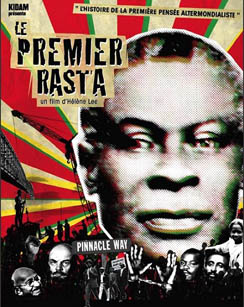
Starts April 26
Original language: Jamaican English
 Before you see the documentary The First Rasta, you might look up some basics under “Rastafari Movement.” You will learn that Leonard Howell (1898-1981) was the first (or one of the first) leaders of the Rastafari religious movement. He founded Pinnacle, a community of about 2600 souls in Jamaica. The followers believe that Haile Selassie, former emperor of Ethiopia, is the actual second coming of Christ, and that marijuana (called ganja) is legal and helpful in finding God.
Before you see the documentary The First Rasta, you might look up some basics under “Rastafari Movement.” You will learn that Leonard Howell (1898-1981) was the first (or one of the first) leaders of the Rastafari religious movement. He founded Pinnacle, a community of about 2600 souls in Jamaica. The followers believe that Haile Selassie, former emperor of Ethiopia, is the actual second coming of Christ, and that marijuana (called ganja) is legal and helpful in finding God.
These, and other historical gems, also quickly flash by in the film, so that you must concentrate. We learn that Leonard Howell left the island as a teenager in 1915 and hired on to ships. This was the true form of globalization at the time: sailors went around the world and exchanged ideas and impressions. In 1923 he settled in Harlem, New York, a time of jazz and black power and the influence of Marcus Garvey, a promoter of Negro rights. In the early 1930s Howell returned to Jamaica to preach and around 1939-41 he had enough followers so that he could set up Pinnacle, a self-efficient colony in the Jamaican hillside, away from “Babylon,” (the term used to depict the evil society of the Western World.) As its leader, he was The Gong or the “mystic man.” Some years of happiness (and successful marijuana sales) later, the police raided the area, arrested the leaders and destroyed it so completely that the inhabitants moved back to Kingston.
The facts are important, but the real soul of the film derives from the many elderly, colorful Rastafarians who recall the beginning, not only in words, but in music. And music was a core part of the movement, and no one furthered the music more successfully than Bob Marley, who comes in at the end of the story. This amazing oral history, told in a Jamaican-English dialect, which is, itself, also a form of music—easy to understand, but just to make sure, there are English subtitles. The First Rasta, by Hélène Lee, is valuable as a historical document and also a good introduction to another film which will open a few weeks later called Marley. It’s about the life of Bob Marley and the impression made on him by the Rastafarian Movement. The two films complement each other very well.
